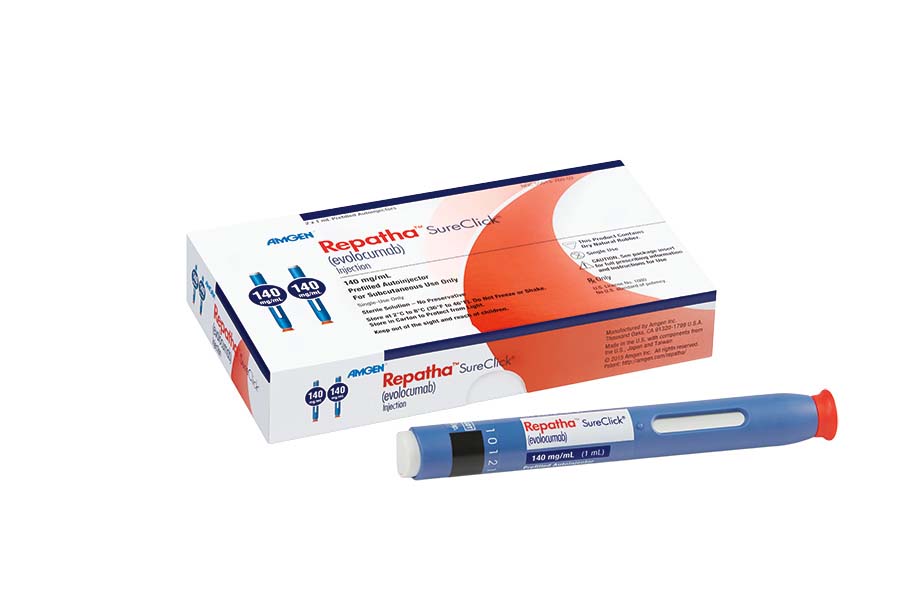Good news for Amgen as Repatha reverses atherosclerosis

Amgen’s next-generation cholesterol drug has shown it can reverse the build up of plaque build-up in coronary arteries which can lead to a heart attack or stroke.
The company’s Repatha (evolocumab) was added to optimised statin therapy in a phase 3 trial, and resulted in statistically significant regression of atherosclerosis in patients with coronary artery disease (CAD).
The results are very encouraging news for Amgen and Repatha, which is in a head-to-head marketing battle with Sanofi and Regeneron’s Praluent to be the dominant PCSK9 inhibitor.
Both drugs have faced resistance from US payers reluctant to pay for the high-priced medicines, which have a list price of $14,000. But if the treatments can show convincing improvements in cardiovascular outcomes, they will see prescriptions take off.
While Amgen’s new GLAGOV trial is not a cardiovascular outcome trial, it points to clear benefits of the drug over existing statin treatment.
Detailed results from the GLAGOV Phase 3 coronary intravascular ultrasound imaging trial were presented at a Late-Breaking Clinical Trials Session of the American Heart Association (AHA) Scientific Sessions 2016 and simultaneously published in the Journal of the American Medical Association.
"The cardiovascular community began conducting imaging studies with LDL-C therapies to measure slowing of atherosclerotic disease progression. This study shows that maximal LDL-C reduction with Repatha can actually regress coronary atherosclerotic disease compared to statins alone," said Sean E. Harper, M.D., executive vice president of Research and Development at Amgen. "In fact, nearly two-thirds of patients on Repatha in this trial, the vast majority of whom were already on high to moderate intensity statin therapy at baseline, experienced a reduction in plaque burden."
The study wasn’t powered to assess effects on cardiovascular events, but there was some modest signs that Repatha produced better outcomes.
An exploratory analysis revealed that positively-adjudicated major cardiovascular events occurred in 12.2% of patients receiving Repatha and 15.3% in those receiving placebo.
The majority of adjudicated events were coronary revascularisations (10.3% Repatha; 13.6% placebo), followed by myocardial infarction (2.1% Repatha; 2.9% placebo). All other adjudicated cardiovascular events occurred in ≤0.8% of patients in each treatment group.
Sean Harper added that the ‘compelling’ data from GLAGOV removed any scientific doubt about the ability of Repatha to lower LDL-C and the impact it has on the critical underlying disease process.
“We remain concerned that many patients are experiencing barriers to accessing Repatha, despite their physician's treatment recommendations. We look forward to our outcomes study, FOURIER, and will continue to work with payers to improve access for patients who need additional LDL-C lowering."
The FOURIER study had originally been expected to produce top line results in late 2016, but Amgen recently said publication will be in the first quarter of 2017.
A date hasn’t yet been confirmed, but the results may be presented at the American College of Cardiology congress in March in Washington.
First results from the Praluent outcome trial, the Odyssey Outcomes are not expected until December 2017, and complete results may be a full 12 months behind Amgen’s.
Sanofi has just released year-to-date sales of Praluent, a disappointing €68 million ($72.8 m) which it says reflects “significant payer utilisation management restrictions in the US and limited market access in Europe.”
Amgen reported a slightly healthier $40 m for Repatha in the third quarter, but revenues for both drugs have disappointed so far.
The companies will have been relieved to hear the news that Pfizer’s own potential contender in the PCSK9 field, bococizumab, has been abandoned by the company because of problems in both efficacy and safety.











